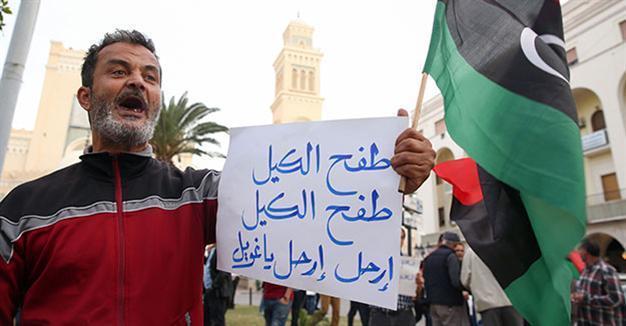Libya's Tripoli-based government says will 'cease duties'
TRIPOLI - Associated Press

A supporter of Libya's new prime minister-designate Fayez al-Sarraj holds his national flag and a poster reading in Arabic: "fed up, fed up, leave, leave Ghweil" in refernce to the unrecognised Tripoli government's prime minister Khalifa Ghweil during a protest in support of the new government in Tripoli's Martyr's Square on March 31, 2016 - AFP photo
One of Libya's rival governments resigned on April 5, a step that helps efforts by a new, U.N.-brokered unity government to assert itself in the capitol, Tripoli, despite opposition from some local militias.
In a statement, the Tripoli-based National Salvation Government said it would "cease duties" as executive authority, and therefore absolve itself of responsibility for the country's fate.
"We put the interests of the nation above anything else, and stress that the bloodshed stop and the nation be saved from division and fragmentation," the statement read.
Western nations view the new government as the best hope for ending Libya's chaos and uniting all factions against an increasingly powerful the Islamic State and the Levant (ISIL) affiliate, which has seized the central city of Sirte. Another government, based in the eastern city of Tobruk, still opposes the U.N.-backed body.
Libya has been dominated by an array of militias since the 2011 uprising that toppled and killed longtime dictator Moammar Gadhafi.
Tuesday's move came after the European Union slapped sanctions on three Libyan officials, including Prime Minister Khalifa Ghweil of the Islamist-backed government in Tripoli, for what it described as hindering the new unity government from beginning its work. The others sanctioned are Agilah Saleh, parliament head in Tobruk, and Nuri Abu Sahmain, who leads the outdated General National Congress.
Hassan al-Sgear, the head of Ghweil's office, said Tuesday's decision came after discussions between his office and the Cabinet on ways to stop the bloodshed in Libya's civil war.
The head of the new government, Fayez Serraj, arrived in Tripoli by sea last week to set up a temporary seat of power in a naval base despite threats from competing factions, which prevented him from arriving by air.
U.S. Secretary of State John Kerry has welcomed Serraj's arrival, as did the U.N. envoy to Libya, Martin Kobler, who was in Tripoli on April 5 and said he received a warm welcome by a population tired of war.
The U.S. and its European allies hope the U.N.-backed government can unify the country and serve as an ally against ISIL. U.S. special forces have been on the ground, working with Libyan officials, and U.S. warplanes have carried out airstrikes.
Libyan officials say small teams of French, British and Italian commandos are also on the ground helping militiamen battling ISIL in the eastern city of Benghazi, though those three countries have not confirmed their presence.
